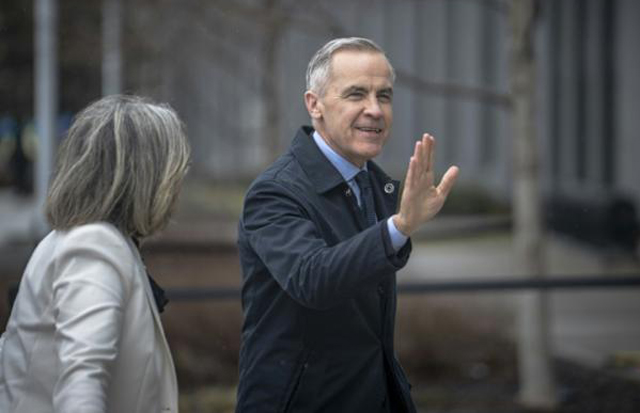News Flash
News Flash

MONTREAL, April 17, 2025 (BSS/AFP) - Canadian Prime Minister Mark Carney avoided major errors in a French debate Wednesday that tested his occasionally shaky language skills, as the election front-runner sought to parry attacks from his conservative opponent.
Carney, who leads Canada's Liberal Party, has at times struggled to articulate his positions in French while campaigning ahead of the April 28 vote, and needed to show during the debate that he was proficient enough to lead the bilingual nation.
After an uncertain start, Carney appeared to grow increasingly comfortable on a night that saw him face sustained attacks from Conservative Party leader Pierre Poilievre, a fluent French speaker.
Carney, who took over as prime minister from Justin Trudeau on March 14, tried to reaffirm the core message of his campaign: that his experience as a central banker during periods of economic upheaval make him the ideal choice to confront President Donald Trump.
The US leader has unleashed a trade war on Canada and incensed the northern neighbor with repeated talk of annexation and making it a 51st state.
"Our relations with the Americans have changed everything, we have to act," said Carney, whose Liberals are leading the Conservatives in most opinion polls.
Poilievre has also promised to stand firm against Trump, but has argued that a decade of weak economic performance under the Trudeau-led Liberals left Canada vulnerable to hostile US trade policies.
While conceding that "no one can control Donald Trump's decision," the Tory leader pledged Wednesday to "put Canada first."
Poilievre continued his effort of trying to tie Carney to Trudeau -- who became deeply unpopular toward the end of his decade in power.
He suggested Carney should be "embarrassed to ask Canadians for a fourth mandate despite a terrible Liberal record."
"I'm not Justin Trudeau," Carney replied. "I just got here."
The leader of the left-wing New Democratic Party, Jagmeet Singh, and the head of the Quebec separatist Bloc Quebecois, Yves-Francois Blanchet, were also be on stage.
But in a departure from past Canadian elections, the influence of the smaller parties could be diminished, with polls indicating this year's race is largely becoming a two-party contest.
- Low expectations -
Wednesday's debate was entirely in French. An English-language debate follows on Thursday.
In a distinctly Canadian decision, Wednesday's debate was moved up two hours to minimize a scheduling conflict with the final regular season game of the Montreal Canadiens hockey team, a cherished Quebec institution.
Carney's campaign in Quebec has drawn particular scrutiny because of his occasional fumbles in French.
Poilievre, like Carney, was raised in the western province of Alberta, but after two decades in parliament the Tory leader has become bilingual.
The Conservatives can secure a government by winning anglophone districts in the West and Ontario, but for the Liberals victory has typically relied a strong showing in Quebec.
The last three Liberal prime ministers -- Trudeau, Paul Martin and Jean Chretien -- all represented Quebec districts in parliament.
- 'United' against Trump-
Trump's rhetoric and trade policies appear to have altered the calculations of some francophone voters.
Carole Potvin, 70, told AFP she had previously voted for the Bloc Quebecois separatists but is considering voting Liberal this year.
"We feel threatened, and to face the American enemy we have to be united," the Montreal resident and retired supermarket saleswoman told AFP before the debate.
Carney's level of French "is not my concern today," she said.
Carney, a 60-year-old former investment banker who led the Bank of England and the Bank of Canada, has brought the Liberals back from potential political ruin.
On January 6, the day Trudeau said he would resign, the Liberals trailed the Conservatives by 24 points, according to the public broadcaster CBC's poll aggregator.
On Wednesday, the CBC data put the Liberals at 43.6 percent support, with the Tories at 37.8.
With a significant number of voters undecided, the race remains volatile.
Political analysts have criticized Poilievre, 45, for struggling to adjust his message in response to Trump, arguing he remains too attached to attacking the Liberals instead of directing his ire at Washington.